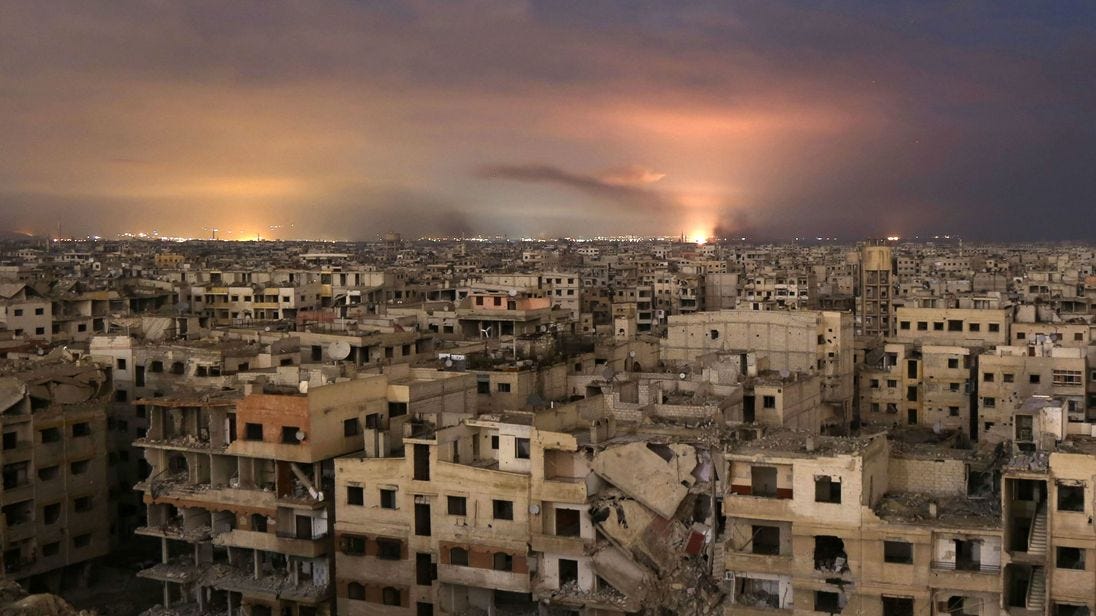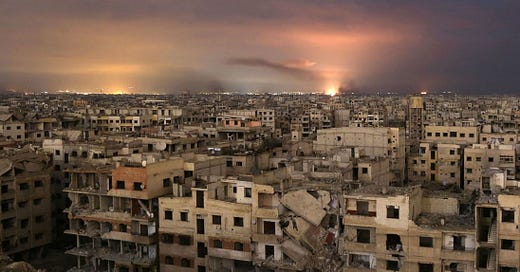
Ghouta, Sicily, Courtesy Sky News
There they were, then, these dark forces, flying in to the horror of everyone. Resuming what they masqueraded as control. Nothing could be worse.
No wonder the country had switched off.
No wonder everybody wanted to leave, disillusioned beyond measure.
The reigning oligarch will once more bring despair to the corridors of power and the already deeply disenchanted electorate.
We will be there in the reaches, waiting for you.
They were flying blind into a wall of rednecks.
He was existential at his best.
The plots to overthrow Turnbull were well afoot.
Difficult to oust a schemer and a scammer.
How awful that we should stoop so low, the Watchers on the Watch lamented. Switching him off. Redirecting the flow of traffic. Inspiring no one.
They were the dead hand that destroyed the country. They were every little broken town and empty bar. They were the aged before they aged, the swing of an unhinged door. They were overgrown weeds and personified neglect, depersonalised, an eerie gasp in a long damp night. Even as the country's own winter of discontent settled in, and the rigor mortis grin of the Prime Minister became the personification of some higher form of defeat. Not of him. His arrogance was uncrushable. His wealth immured him from the suffering of those around him. They would never know, the perpetrators, what they had done to this once beautiful place.
But of a different kind of destruction, different level of defeat. For barren hearts spread their tentacles, their impacts, through bureaucratic structures straight into the centres of everyone's lives.
The evidence was there for all to see.
So they flooded the country with new arrivals.
Mismanaged everything.
Threatened those who did not agree with the police.
Bullied everyone they came in contact with.
Preened, preened, in front of the cameras, as if another acre of their ugly mugs could possibly turn the tide. Of contempt. Of dislike.
Not of grudging respect from the Watchers on the Watch, the sisters in waiting. They had banished the only intelligent empath in their crew, and retreated largely out of range. They, too, thought it was all a criminal joke perpetrated on the populace. Where everybody became a spy. Where tolerance was no longer tolerated. Where a seaside resort was a moment in time. Where compassion had not a single chance. Where the overlords were never brought to account. Where government mismanagement on a massive scale simply passed through to the keeper, became expected.
A disillusioned populace.
A broken individual.
Communities in retreat.
They talked of football and who got wasted last Saturday night. They cared little, in truth, for each other and created their own online communities. Their own halls of fame. Stars of their own show. And slept, slept the sleep of the discontented. Blind to their own arrogance. Comforted by accoutrements and gadgets. Once satiated, now switched off.
There they were.
Something Wicked This Way Comes.
"Man is in love, and loves what vanishes." -W.B. YEATS
The seller of lightning-rods arrived just ahead of the storm. He came along the street of Green Town, Illinois, in the late cloudy October day, sneaking glances over his shoulder. Somewhere not so far back, vast lightnings stomped the earth. Somewhere, a storm like a great beast with terrible teeth could not be denied. Something Wicked This Way Comes, Ray Bradbury, 1962.
THE BIGGER STORY:

The number of Syrians killed in eastern Ghouta since a wave of bombings began a week ago has hit almost 500 following further airstrikes.
The Syrian Observatory for Human Rights said 492 civilians, including 116 children and 64 women, had died in the attacks in the rebel-held enclave.
The latest aerial raids came after the UN Security Council pushed back to Saturday its vote on a resolution demanding a 30-day humanitarian ceasefire across Syria.
Syrian opposition activists say Russian warplanes are taking part in the bombings while many people are hiding in underground shelters with little food and medical supplies.
Russia's UN Ambassador Vassily Nebenzia has said an immediate ceasefire is unrealistic and in what appeared to be a bid to get Russian support, sponsors Kuwait and Sweden amended the draft resolution to drop a demand that the ceasefire take effect 72 hours after the resolution's adoption.

Anyone routinely caught in gridlocked traffic or forced to look further and further beyond city limits to find affordable housing will be well familiar with the obvious: Australia’s population is growing like Topsy. Even so, a population forecast released by Infrastructure Australia makes for sobering reading.
The federal government advisory body forecasts that Australia’s population will increase by 11.8 million people by 2046. That’s equivalent to adding a new city the size of Canberra each year for the next 30 years. But it’s existing cities that will bear the brunt of that growth: 75 per cent of the projected population growth will occur in Sydney, Melbourne, Brisbane and Perth.
Think what this means. Australia’s population will increase from 24.8 million to 36.6 million in just 30 years. Our congested capital cities will be even more crowded and the pressure for urban boundaries to expand even further will intensify.
It beggars belief that Australia does not have a formal population policy. The only reason we do not is that timid governments – especially the Turnbull government, the most timid of them all – fear public reaction to big population numbers. If Australians are instinctively reluctant to embrace the idea of a big Australia then it is up to the federal government to spearhead a “national conversation” to cast those fears away.



